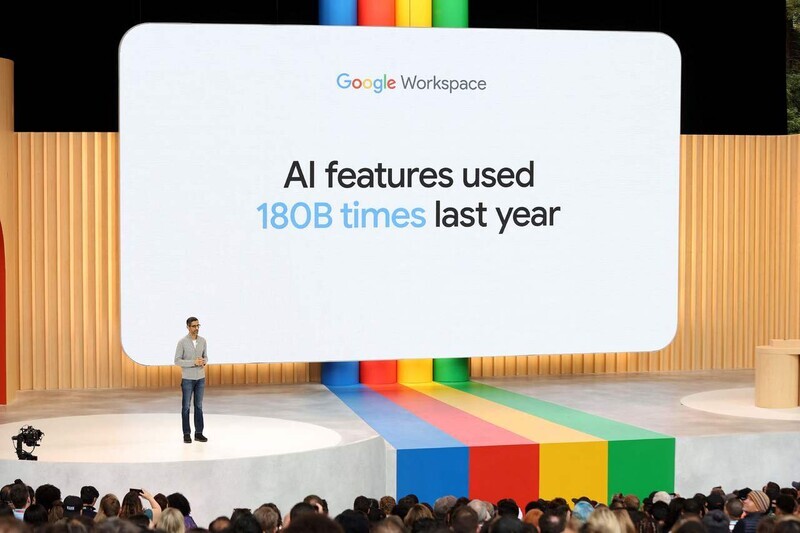hankyoreh
Links to other country sites 다른 나라 사이트 링크
Google’s release of Korean-equipped AI chatbot Bard puts local tech firms on edge

After a limited release last March, Google has released Bard, a conversational generative artificial intelligence (AI) chatbot, in 180 countries. Following an initial release in English, the company says the second language it will support will be Korean, prompting concern from the domestic tech industry.
On Wednesday (local time), Google held its annual developer conference “Google I/O” at its headquarters in Mountain View, California, where it announced that Bard, which is powered by PaLM 2, will be fully released in 180 countries including the United States and Korea.
PaLM 2 is a language model trained on 540 billion parameters that supports more than 100 languages. Not only can it work on scientific and mathematical reasoning, but it is also capable of coding in more than 20 programming languages. As of Thursday, Bard is now available in Korean as well as Japanese. The company also announced plans to expand the service to more than 40 languages.
“Let’s say you’re working with a colleague in Seoul and you’re debugging code,” wrote Pichai in a blog post on the update. “You can ask it to fix a bug and help out your teammate by adding comments in Korean to the code. It first recognizes the code is recursive, then suggests a fix. It explains the reasoning behind the fix, and it adds Korean comments like you asked.”
Google’s first foray into a large-scale Korean language model is anticipated to set Korea\'s own Big Tech on edge. Korean companies such as Naver, Kakao, and KT have been putting pedal to the metal developing Korean-based conversational AI, in a race to not cede control on Korean language models to foreign firms. Naver is poised to release its HyperCLOVA X, an AI that has been trained on 6,500 times the Korean data as OpenAI’s ChatGPT, this summer. Kakao is preparing to release KoGPT, a language model specialized for Korean, before the end of the year.
“I think it’s more competitive to build separate super-sized AI models specialized for individual cultures and regions,” said an official from a local tech company who declined to be named.
“Both Google and Microsoft have a huge amount of funding and investment in AI compared to domestic big tech companies, so domestic companies can’t help but be nervous about the news of Bard’s Korean support,” said another tech company official.
Google has also built Bard into its products, including its search engine. It seems to be a nod to Microsoft, which collaborated with OpenAI to introduce ChatGPT to its search engine and work productivity tools such as PowerPoint.
On Monday, Google unveiled its “Search Generative Experience,” an application of Bard to its search engine. As users type in search queries, other questions related to those queries are presented in the form of sentences. When one user typed the topic “new bike” into the search bar during a demonstration, a series of related questions popped up underneath, such as “the color blue is trending, how about this?”
“A search engine with Bard will provide a more human and personalized experience for users,” Google said.
The company is also tinkering with its “10 Blue Links” approach, which it has employed since its founding in 1998. Instead of displaying 10 related websites in the form of blue links in search results, Google has decided to display short-form videos, images, and text posted on social networking services such as TikTok and Instagram or online community boards at the top of search results.
Google Workspace products such as Gmail and Docs will also be equipped with new features utilizing Bard.
By Chung In-seon, staff reporter
Please direct questions or comments to [english@hani.co.kr]

Editorial・opinion
![[Column] When ‘fairness’ means hate and violence [Column] When ‘fairness’ means hate and violence](https://flexible.img.hani.co.kr/flexible/normal/500/300/imgdb/original/2024/0516/7417158465908824.jpg) [Column] When ‘fairness’ means hate and violence
[Column] When ‘fairness’ means hate and violence![[Editorial] Yoon must stop abusing authority to shield himself from investigation [Editorial] Yoon must stop abusing authority to shield himself from investigation](https://flexible.img.hani.co.kr/flexible/normal/500/300/imgdb/original/2024/0516/4417158464854198.jpg) [Editorial] Yoon must stop abusing authority to shield himself from investigation
[Editorial] Yoon must stop abusing authority to shield himself from investigation- [Column] US troop withdrawal from Korea could be the Acheson Line all over
- [Column] How to win back readers who’ve turned to YouTube for news
- [Column] Welcome to the president’s pity party
- [Editorial] Korea must respond firmly to Japan’s attempt to usurp Line
- [Editorial] Transfers of prosecutors investigating Korea’s first lady send chilling message
- [Column] Will Seoul’s ties with Moscow really recover on their own?
- [Column] Samsung’s ‘lost decade’ and Lee Jae-yong’s mismatched chopsticks
- [Correspondent’s column] The real reason the US is worried about Chinese ‘overcapacity’
Most viewed articles
- 1Could Korea’s Naver lose control of Line to Japan?
- 2[Column] Welcome to the president’s pity party
- 3[Column] US troop withdrawal from Korea could be the Acheson Line all over
- 4Naver’s union calls for action from government over possible Japanese buyout of Line
- 5[Editorial] Korea must respond firmly to Japan’s attempt to usurp Line
- 6Korea cedes No. 1 spot in overall shipbuilding competitiveness to China
- 7[Editorial] Yoon must stop abusing authority to shield himself from investigation
- 8[Column] When ‘fairness’ means hate and violence
- 9Korean opposition decries Line affair as price of Yoon’s ‘degrading’ diplomacy toward Japan
- 10Second suspect nabbed for gruesome murder of Korean in Thailand, 1 remains at large